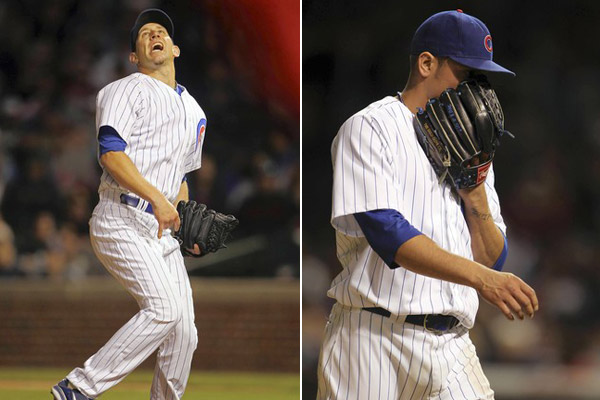
After a century of futility, the natives are already restless, a mere seven months into the Epstein-Hoyer era.
The Cubs just broke an 12-game losing streak, coming within two losses of the franchise record and casting the team into the cellar where everyone expected them to be this year, tied with the atrocious Twins for the worst record in baseball. But a couple things should give fans hope, at least by the low bar of the 2012 Cubs: they've lost 12 straight twice before, in the strike-shortened 1981 season, and in 1970, when they finished above .500. Second: they're not as bad as their record suggests (except for the bullpen, which really is awful).
Their biggest problem so far in 2012? They're the least clutch team in baseball, truly awful—or perhaps just unlucky—when the game is on the line. They're probably not the worst team in baseball, but for the first third the season, the Cubs have easily been the most frustrating.
Let's start with hitting. By the most important number in all of baseball, the Cubs are pretty bad: fourth worst in runs scored. But oddly enough, they're not that bad by most other measures. Their average is in the middle of the pack, just behind the division-leading Orioles and Indians. Their slugging percentage is below average, tenth-worst, but ahead of respectable teams like the Marlins and Mets. Their biggest problem has been getting on base: at a .305 OBP, they're sixth-worst in baseball, though as much difference separates them from the awful Pirates offense (.274) as from the patient Indians (.336).
The Cubs' on-base problems have been isolated at two positions: third base, where Ian Stewart remains under the Mendoza Line, and catcher, where Geovany Soto, perpetual backup Koyie Hill, perpetual backup-backup Wellington Castillo, someone named Blake Lalli, and Steve Clevenger have combined for a .210/.270/.337 line. Hill has managed to not walk, once, in 24 at bats. (From 2009-2011, Hill was the fourth-worst hitter in baseball by weighted on-base average for all batters with a minimum 600 plate appearances.)
But the Cubs' problems at catcher could improve by subtraction. With Soto out and Castillo, Hill, and Lalli all scuffling, Clevenger looks to get some at bats, and he's actually hit this year, with 11 hits in 23 at bats. By comparison, Soto has 15 hits in 104 at bats. It's unlikely that Clevenger is more than a band-aid on a massive head wound, but it's better than continuing to bleed.
Alfonso Soriano has been… not terrible. Predictably, he's bounced back from last season, but he has a tendency to fade as the season progresses, so right now we're on Anthony Rizzo Watch. The highly regarded first baseman has been raking in Iowa, and could push Bryan LaHair into the outfield and Soriano to the bench.
But what's really been killing the Cubs is how they hit in the clutch. In high-leverage situations—close games in late innings with runners on—the Cubs are hitting .195, tied for second-worst in the majors, with 36 RBI (also second-worst) and 67 strikeouts in 195 high-leverage at bats (far and away the worst). In high-pressure situations, they're striking out one-third of the time. To put that in context, Bryan LaHair has the seventh-highest strikeout rate in baseball; the Cubs, as a team in their most important at bats, strike out just a bit more often than LaHair. The good news? No team has hit under .200 in high-leverage situations in the past decade, and only one team has hit under .210, the historically awful 119-loss Tigers of 2003. So that number will almost inevitably come up, and with it the Cubs' record.
On the flip side of the inning, the team is just as bad on the mound in the clutch. In high-leverage situations, the Cubs have a 12.54 ERA, second-worst in baseball behind the Braves and over a full run behind the Cardinals. Their opponents in high-leverage situations have a .389 OBP, the highest in baseball, to go along with a .250 batting average and a .457 slugging percentage. By comparison, Alex Rodriguez is hitting .277/.361/.424 this year—basically, every batter they face when it really matters has been A-Rod.
The Cubs' strikeout percentage in the clutch is the worst in baseball, at 13.2 percent; their walk rate is third worst, at 14.3 percent; and their strikeouts-to-walks ratio is the worst, averaging more walks than strikeouts in the clutch, the only team in baseball to do so.
Again, though, it's a relatively isolated problem. Recently retired Kerry Wood, in his four innings of high-leverage work, walked nine and struck out one. Recently demoted Rafael Dolis, whose last major-league appearance before getting sent back to Iowa ended with him walking two batters on nine pitches, gave up eight earned runs in nine innings of high-leverage work. Recently demoted Chris Volstad gave up eleven earned runs from twelve batters in similar situations. If Volstad's replacement, Travis Wood, continues to struggle, under-heralded lefty Chris Rusin is pitching well at Iowa.
In their 12-game losing streak, half the Cubs' losses were one-run ballgames. In games decided by three runs or less, the Cubs are 8-20, and are tied for the second-worst comebacks-to-blown-wins differential: seven comeback wins, 13 comeback losses. With last night's win, they're tied with the Twins for the worst record in baseball—but from the excruciating experience of watching them, from the fan's perspective, they've been the worst team in baseball so far.
Photographs: Chicago Tribune



